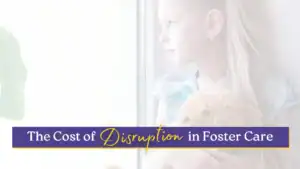Cindy Tarrant first learned about foster care from a minister at her church. She and her husband watched as the minister’s family welcomed children in foster care into their home. It was a new concept for them. Foster care had always been something they saw in movies, but it wasn’t an integral part of their Christian faith.
With three children of their own, Cindy and her husband started to discuss the possibility of foster care. They were passionate about serving Christ in a tangible way. “We wanted to get our hands and feet into something that was going to affect change in someone’s life,” she recalls. Foster care was a clear way to make a difference. However, they struggled to find many other families who were also fostering. “Everybody thought everybody else was fostering,” she says. “People may assume others are fostering, so they don’t see it as a need that needs to be filled, but in reality, not many families are actually fostering, or at least not nearly enough.”
Knowing that they were called to foster, Cindy and her husband moved ahead in the process. They attended an informational meeting, and three months later – almost to the day – they signed their license. They sat their kids down and talked to them about foster care. “Our kids were excited. They didn’t have any concept of what could go badly,” Cindy says. Instead, they just thought they were getting playmates.
How Foster Care Affects You, Your Family, and Your Faith

One of the fears that keeps people from fostering is the question of how it could hurt their biological children. “It will hurt,” Cindy states, “but they will grow.” Your children will become stronger through the difficulties and loss. In thinking of her own children, Cindy says, “I can see how compassionate they can be.” She’s found that they aren’t afraid to step into something hard. Cindy recognizes that there are few ways to teach a child core Christian characteristics like kindness and love as poignantly as through foster care. “I’m so proud of who they are,” Cindy says with a smile.
Cindy sees changes in herself, too. “I’m less judgmental about other people’s circumstances. I’m less likely to stay away from people just because their life is spinning out of control.” The messiness of other people’s lives feels normal to Cindy now because she has been walking through the journey with others for so long. As much as she loves that foster care has changed her, she loves even more how much it has changed her children and their family as a whole.
When the Mission Field Lives in Your Home
For Cindy, the most rewarding part of being a foster family is seeing how her whole family lives in full-time ministry. “When the mission field lives inside your home, there’s no escaping it,” she says. It is challenging, for sure, but her family has grown so much through it. They view foster care as their Christian mission field. One thing Cindy has learned is this: “Loving like Jesus looks a little bit different when you can’t leave and go home at the end of the day.” Each day, you have an incredible opportunity to put the love of God on display.
Loving like Jesus looks a little bit different when you can’t leave and go home at the end of the day.
Cindy Tarrant, Foster Mom
Whether a child in foster care stays in your life for a day or for years, you can affect their life by being a praying parent. Even if they are not staying in your home anymore, write their name down and remember to pray for them. This is especially important for older children and teens since your time with them can be so short. Tell them about Jesus. There is no guarantee that they will hear about Him once they no longer live with you. Teach them how to keep pointing themselves back to the truth of who Jesus says they are.
What Cindy Wishes She Had Known

Cindy is honest about the challenges she and her family faced while fostering. “If I had known then what I know now, I would have asked for recommendations for wrap-around support for our family,” she says emphatically. A support network would have been a game-changer for them from the beginning. She encourages anyone thinking of fostering to identify support. Whether you have a church group, mentors in the field, friends who will listen to the hard stuff, trauma-informed pediatricians and therapists, or a combination, support is crucial. If your church does not already have a foster/adoptive family ministry, learn how to start one. Having support ready to go is key to your success as a foster family. “It’s hard to backpaddle to find all of that information once you have a kid in your house,” Cindy says from experience.
Cindy was also surprised by how often people treated her like the “savior.” People would tell her, “Those kids are so lucky [to have you]. Thank goodness you saved them from their situation.” Cindy is clear about her stance: “We are not their saviors, and we shouldn’t allow ourselves to think we are.” Even Christians can be quick to judge parents whose children are in foster care. But God’s grace enables us to show love and mercy for others. He equips us to treat others in the way we would want to be treated.
After twelve years of fostering, Cindy has learned to put herself in the shoes of the biological parents. “If I felt safe in knowing that someone was taking care of my child with the intentions of sending them back to me,” Cindy considers, “that would change how I would take care of myself.” Cindy knows that her actions can change everything for children and their biological family. When she imagines the situation reversed, she can refocus on the case plan, even when it is hard.
Encouragement for Your Journey

For those approaching foster care from a Christian perspective, you know exactly where your strength comes from. You can rest on God’s promise that His mercies are new every morning (Lamentations 3:22-23). As Cindy knows from experience, you might often find yourself wondering, “Why are we doing this?” But each day, you have the opportunity to show people that Jesus loves them, whether case workers, biological parents, teachers, pediatricians, or anyone else. Those people can watch you walk through hard times without giving up. It will make them wonder why. Then, you can share how your faith in Christ helps you get through the hardest days as a foster family.
















